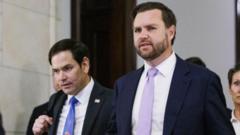In a stunning breach, a group chat on the encrypted messaging app Signal, containing sensitive discussions among top national security officials about an impending U.S. military strike in Yemen, was inadvertently observed by influential political journalist Jeffrey Goldberg of The Atlantic. This incident, confirmed by the National Security Council, has raised serious questions about the operational security of the Trump administration.
Goldberg reported that he was added to the group chat by National Security Adviser Michael Waltz, with prominent figures such as Vice President JD Vance, CIA Director John Ratcliffe, and Secretary of Defense Pete Hegseth also participating. Within the group, officials discussed the execution of the strike, with Waltz praising the operation shortly after it occurred, signaling internal celebrations over the military action.
However, the leak was quickly met with widespread scrutiny from both sides of the political spectrum. Senator Mark Warner, the leading Democrat on the Senate Intelligence Committee, condemned the event as a significant failure of operational security that could jeopardize national safety. Meanwhile, Congressman Chris Deluzio called for immediate congressional hearings, labeling the situation as an outrageous breach of national security protocol. Even some Republicans, like Congressman Don Bacon, expressed deep concern over the administration's use of unsecured communication for sensitive matters, emphasizing the risks posed by foreign intelligence over such lapses.
In light of the event, nationwide discussions around accountability within the administration have gained traction, especially regarding potential resignations in the wake of the incident. Trump, when asked about the leak, claimed ignorance of the situation, while the White House defended its national security team, insisting their actions were effective despite questions surrounding the integrity of their communications.
Additionally, the chat brought to light divisions within the national security team, particularly regarding the decision to strike. Vice President Vance expressed hesitance about the military action, suggesting it might exacerbate instability and economic repercussions. His internal dissent is not unprecedented in U.S. political history, recalling past vice presidential disagreements over foreign policy matters.
As criticism mounts around the administration's handling of sensitive information, it's worth recalling similar controversies from previous administrations. Trump's comments on classified matters have come full circle, especially as the handling of sensitive information hangs in the balance, reminiscent of past controversies with figures like Hillary Clinton and Joe Biden.
In the wake of this incident, the political fallout is expected to reverberate through Washington, with calls for reform in how national security communications are managed going forward. With the integrity of classified information at stake, this incident may serve as a critical point of reflection for the administration and beyond.


















